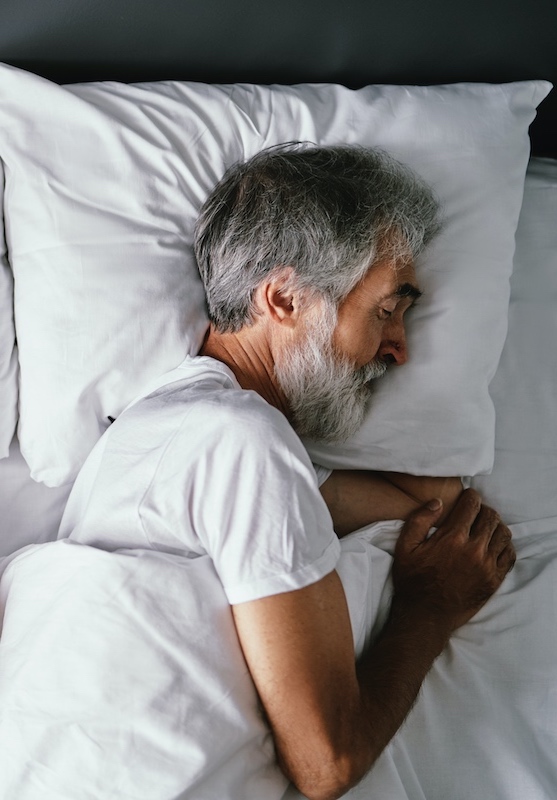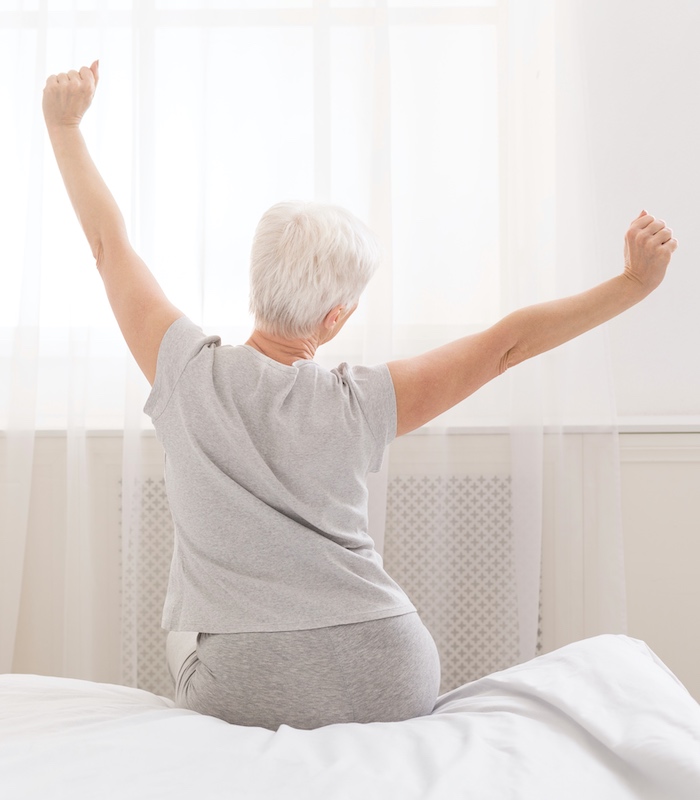Quality Sleep is an Easily Overlooked Component of Senior Care
Did you know that an alarming 40-70% of aging adults have chronic sleep problems? These problems range from insomnia to restless leg syndrome and daytime drowsiness, all negatively impacting the quality of life as seniors age. Depression and mental health ailments among the aging population are gaining more attention. But the correlation between mental health and quality sleep is still easily missed. Good sleep is imperative for healthy aging. It provides restorative relief that keeps the mind sharp and energy levels up.

How to Ensure Seniors Get Good Sleep
The basics of getting good sleep are the same regardless of your age. The only difference is that it seems to be a little more difficult to fall asleep and stay asleep as you age. Still, it’s important to do what you can to promote good sleep so that you can feel good throughout the day and ward off cognitive decline. Start by addressing these sleep habits:
Stick to a Schedule
All humans have a circadian rhythm that helps us naturally want to sleep during optimal (dark) hours and stay awake during daylight hours. Don’t fight your natural rhythm. Embrace it, sticking to a schedule for going to bed and waking up around the same time each day. Seniors, like most adults, should get 7-9 hours of sleep each night.
Get Comfortable
We get it–aches and pains are common and may disrupt your sleep. These are exacerbated by the mattress you use. Find a good quality mattress that perfectly balances comfort and support. Add a blanket that is soft and warm, along with just enough pillows to support a natural posture based on your personal sleeping habits.
Make it Dark
The presence of light, even while we’re sleeping, can signal to the brain that it’s time to wake up. Use blackout curtains and minimal nightlights with natural hues to keep your sleep space as dark as possible overnight.
Don’t Overlook Sleep Quality When Choosing a Senior Living Facility
There’s a lot that goes into making a decision on a senior living facility. Whether you’re choosing for your loved ones or making the decision on your own–here are a few more considerations to keep in mind.
Location is More Important than You Might Realize
When you consider the location of a senior facility, you’re probably concerned with how far relatives will need to travel for visits. You might also consider proximity to doctors and other routine appointments. But one thing you might be overlooking is the proximity of the facility to industrial disturbances like highway traffic or noise pollution. The constant humdrum of noisy traffic on a nearby freeway can keep you or your loved one awake at all hours of the night, robbing them of good quality sleep.
Quality of Care
Another important consideration is the quality of care at the facility. How experienced are staff members and how much attention can they provide each resident are common questions. But a better question might be–how are overnight procedures handled? If the staff make quality sleep a priority, you’re likely to experience fewer disruptions that keep you or your loved one awake at night.
Activities and Socialization
Another reason that many families choose senior living facilities is to provide opportunities for daily activities and natural socialization. Having the option to participate in an active social calendar is important for keeping depression at bay. Withdrawal from these activities might signal a mental health problem or a sleep quality problem. When you’re shopping for a place to call home, ask about opportunities and how and when staff might intervene if a resident suddenly shows behavioral changes.
Personal Needs and Requirements
Beyond the basics, many families want to know if a particular facility is equipped to take care of the personal needs of their loved one. This could include frequent doctor’s visits, additional care, or help with mobility issues. A senior living facility is where you or your loved one will call home and it should be tailored to fit individual needs, including specific healthy sleep needs if necessary.

How to Know When You’ve Found the Right Fit
Choosing a Boynton Beach senior living facility is no small feat. There are plenty of facilities to choose from. However, not all facilities can meet your needs. At Courtyard Gardens, we make quality care and personal needs our priority. If you or your loved one experience trouble with sleep, we can provide support to help establish healthy routines and improve sleep quality. As you look for a facility that can fit your needs, consider all your needs carefully. Quality care and an accessible environment are just the beginning. Senior citizens need support in many different ways, including help monitoring and establishing healthy sleep patterns.



